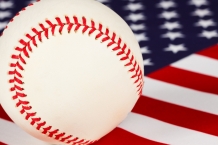 The summer breeze awakened the flag, unfurling its colors above the crowded Greenville Drives baseball stadium in South Carolina. With thousands of other fans, I stood, hand over heart, waiting to pledge allegiance in song.
The summer breeze awakened the flag, unfurling its colors above the crowded Greenville Drives baseball stadium in South Carolina. With thousands of other fans, I stood, hand over heart, waiting to pledge allegiance in song.
Across the stadium, I spotted the young woman preparing to lead us in “The Star Spangled Banner.” My usual apprehension at the quality of hometown divas vanished when, rather than shaking out the first note, she belted out the lyrics more confidently than any other amateur anthem singer I’d heard.
“O say, can you see, by the dawn’s early light, what so proudly we hailed at the twilight’s last gleaming?”
Though the woman’s crystalline voice reassured me, my cynical side braced for the high note that most singers screech on. I clinched my eyes shut, cringing preemptively.
“And the rockets’ red glare—”
In her dramatic pause, I reveled, indulging in my relief of a well-hit note and the pride of the patriotic tune.
But the pause stretched into a stop.
“I’m sorry.” The woman laughed nervously into the microphone. “Can I start over?”
The entire stadium shuffled uncomfortably as she cleared her throat and started “O saying” from the very beginning. Settling once again into the patriotic ambiance, I turned back to the flag, my hand still resting reverently on my chest.
She started “O saying” from the very beginning.
As she neared the rocket line, again I took a deep breath and held it through the perilous fight and the ramparts gallantly streaming, all the way up to—
“And the rockets’ red glare—”
Once again the rockets hovered in the heat-laden summer air.
With the eyes of the stadium on her, the woman shook her head. “I’m sorry. I can’t finish it.” This time, she handed over the microphone and walked off the field.
“I’m sorry. I can’t finish it.”
The National Anthem, at least for the adult generation in the stadium, entered our repertoire in kindergarten, as familiar as the alphabet. But instead of any one of us finishing the lines, we hesitantly lowered our hands, the announcer yelled, “Play ball,” and the evening continued as if one of the most awkward moments in the history of sporting events hadn’t just happened.
In fact the crowd seemed to have already disregarded the incident entirely as the players approached the plates and the game began. But I carried with me the uneasy feeling of a duty shirked, of a sacred thing offended with no one to defend its honor.
Inning to inning, the scene replayed itself over in my head until the game ended with fireworks and music blaring. I shuffled out of the stands, one drop among a river of people.
Just before leaving the stadium, I glanced back at the field, imagining a different version of the evening. The woman relinquishing the microphone. The crowd searching for direction. And in the blank of silence, instead of the resonating drawl of “play ball,” my tiny voice leading the stadium in letting the final lines burst in the air—
Americans uniting in song, finding the words together.
